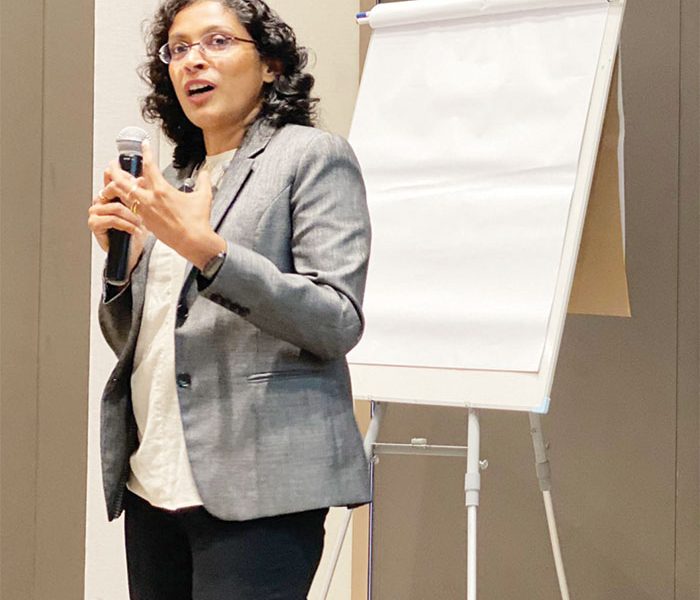News
Prof Malavige predicts dengue will get worse with climate change unless…

By Rathindra Kuruwita
The impact of dengue will probably get worse due to climate change, Professor Neelika Malavige of the Department of Immunology and Molecular Medicine, University of Sri Jayewardenepura and Head of Dengue Global Programme and Scientific Affairs, Drugs for Neglected Diseases Initiative (DNDi) has said recently at a conference organized by DNDi in Thailand.
The conference was held in parallel to the 20th International Congress for Tropical Medicine and Malaria (ICTMM). DNDi is a non-profit drug research and development (R&D) organization that is developing new treatments for neglected diseases like dengue.
Professor Malavige said that as the world got warmer, dengue would spread to Europe and North America. She added that dengue fever had become increasingly common in recent decades worldwide with around 390 million infections occurring each year. Climate change had been identified by WHO and other national, and international health authorities as one of the primary causes of the global spread of dengue fever and other Aedes aegypti-transmitted viral infections, she said.
“The weather has an impact on vector-borne illnesses. Rainfall and ambient temperature are referred to as macro factors that influence dengue since they directly impact Aedes aegypti population density,” Prof. Malavige said.
The population density of Aedes aegypti declines when the average temperature is lower.
“The larval development time, larval and adult survival, and duration of the gonotrophic cycle of the dengue vector are directly affected by climatic factors such as ambient temperatures, rainfall, and relative humidity. Vectors are increasing due to increasing temperature. As temperature increases the mosquitoes mature faster, giving them more time to spread the disease,” she said.
On the other hand, increasing population, lifestyle changes and uncontrolled urbanization are also reasons for the rapid global spatial spread of dengue, she said.
“Risk factors like obesity, and diabetes are also increasing among the people. Those with these diseases are more likely to suffer from more serious forms of dengue.”
Doctors and medical administrators in countries with dengue were efficient in managing the disease and this explains why the mortality is lower. However, when there was an overload of cases, the system monitoring and evaluating dengue patients for severity suffers because keeping an eye on each patients becomes an impossibility, Professor Malavige said. “There is a shift in the age of those who get infected. Earlier it was a disease that children got. Now you can find patients from all age groups,” she said.
Commenting on attempts to develop a vaccine for dengue, most recently by Takeda Pharmaceutical Company, Professor Malavige said that the data available looked promising. The vaccine could be soon registered in Latin America and Asia. The current data shows that it reduces hospitalization by about 80%. This is similar to the effectiveness of COVID vaccine, although long term safety data for a dengue vaccine is needed for all serotypes. However, it is unfortunate that there is not yet a designated treatment for dengue.
“Dengue is a disease of the low income countries. Infection of the developing world. Each year hundreds of millions of people are affected by dengue but there is still no treatment for it. Would we have a vaccine so fast if COVID too was a disease of the low income countries? The amount of research done on COVID for the last two years is immense. Not even 10% of the research volume has been directed for dengue. There are not enough funds for dengue research. Global North has done some research but the researchers are far away from the disease. The perspective will be different if they too had to live with dengue,” she said.
Dr. Isabela Ribeiro, Viral Diseases Cluster Director, DNDi said that countries of the Global South must cooperate with each other to find a cure for dengue. There are a number of pharmaceutical powerhouses in the Global South and they can work together to find a cure, she said.
“The World Health Organization’s (WHO) report on neglected tropical diseases, ‘A road map for neglected tropical diseases 2021–2030’ does not mention a treatment for dengue. Their focus is on vaccines and vector control,” she said.
Meanwhile, Jean-Michel Piedagnel, South-East Asia Director, DNDi said that while taking steps to prevent dengue, from vector control to using mosquito repellant was important, it should not be allowed to mask the fact that there was no treatment.
“There is no treatment because there is not enough funding. We must not forget that. Each year hundreds of millions are affected by dengue. They deserve treatment,” he said.